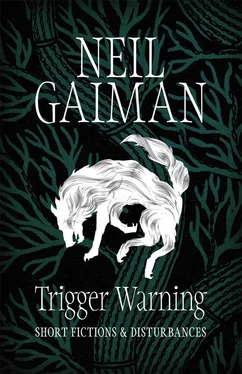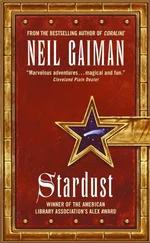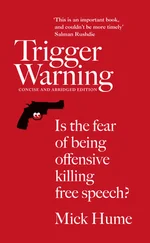Neil Gaiman - Trigger Warning - Short Fictions and Disturbances
Здесь есть возможность читать онлайн «Neil Gaiman - Trigger Warning - Short Fictions and Disturbances» весь текст электронной книги совершенно бесплатно (целиком полную версию без сокращений). В некоторых случаях можно слушать аудио, скачать через торрент в формате fb2 и присутствует краткое содержание. Год выпуска: 2015, Издательство: Headline, Жанр: Старинная литература, на английском языке. Описание произведения, (предисловие) а так же отзывы посетителей доступны на портале библиотеки ЛибКат.
- Название:Trigger Warning: Short Fictions and Disturbances
- Автор:
- Издательство:Headline
- Жанр:
- Год:2015
- ISBN:нет данных
- Рейтинг книги:4 / 5. Голосов: 1
-
Избранное:Добавить в избранное
- Отзывы:
-
Ваша оценка:
- 80
- 1
- 2
- 3
- 4
- 5
Trigger Warning: Short Fictions and Disturbances: краткое содержание, описание и аннотация
Предлагаем к чтению аннотацию, описание, краткое содержание или предисловие (зависит от того, что написал сам автор книги «Trigger Warning: Short Fictions and Disturbances»). Если вы не нашли необходимую информацию о книге — напишите в комментариях, мы постараемся отыскать её.
Trigger Warning: Short Fictions and Disturbances — читать онлайн бесплатно полную книгу (весь текст) целиком
Ниже представлен текст книги, разбитый по страницам. Система сохранения места последней прочитанной страницы, позволяет с удобством читать онлайн бесплатно книгу «Trigger Warning: Short Fictions and Disturbances», без необходимости каждый раз заново искать на чём Вы остановились. Поставьте закладку, и сможете в любой момент перейти на страницу, на которой закончили чтение.
Интервал:
Закладка:
I have lost people, though.
It’s strange when it happens. I don’t actually lose them. Not in the way one loses one’s parents, either as a small child, when you think you are holding your mother’s hand in a crowd and then you look up, and it’s not your mother . . . or later. When you have to find the words to describe them at a funeral service or a memorial, or when you are scattering ashes on a garden of flowers or into the sea.
I sometimes imagine I would like my ashes to be scattered in a library. But then the librarians would just have to come in early the next morning to sweep them up again, before the people got there.
I would like my ashes scattered in a library or, possibly, a funfair. A 1930s funfair, where you ride the black . . . the black . . . the . . .
I have lost the word. Carousel? Roller coaster? The thing you ride, and you become young again. The Ferris wheel. Yes. There is another carnival that comes to town as well, bringing evil. ‘By the pricking of my thumbs . . .’
Shakespeare.
I remember Shakespeare, and I remember his name, and who he was and what he wrote. He’s safe for now. Perhaps there are people who forget Shakespeare. They would have to talk about ‘the man who wrote to be or not to be’ – not the film, starring Jack Benny, whose real name was Benjamin Kubelsky, who was raised in Waukegan, Illinois, an hour or so outside Chicago. Waukegan, Illinois, was later immortalised as Green Town, Illinois, in a series of stories and books by an American author who left Waukegan and went to live in Los Angeles. I mean, of course, the man I am thinking of. I can see him in my head when I close my eyes.
I used to look at his photographs on the back of his books. He looked mild and he looked wise, and he looked kind.
He wrote a story about Poe, to stop Poe being forgotten, about a future where they burn books and they forget them, and in the story we are on Mars although we might as well be in Waukegan or Los Angeles, as critics, as those who would repress or forget books, as those who would take the words, all the words, dictionaries and radios full of words, as those people are walked through a house and murdered, one by one, by orangutan, by pit and pendulum, for the love of God, Montressor . . .
Poe. I know Poe. And Montressor. And Benjamin Kubelsky and his wife, Sadie Marks, who was no relation to the Marx Brothers and who performed as Mary Livingstone. All these names in my head.
I was twelve.
I had read the books, I had seen the film, and the burning point of paper was the moment where I knew that I would have to remember this. Because people would have to remember books, if other people burn them or forget them. We will commit them to memory. We will become them. We become authors. We become their books.
I am sorry. I lost something there. Like a path I was walking that dead-ended, and now I am alone and lost in the forest, and I am here and I do not know where here is any more.
You must learn a Shakespeare play: I will think of you as Titus Andronicus . Or you, whoever you are, you could learn an Agatha Christie novel: you will be Murder on the Orient Express. Someone else can learn the poems of John Wilmot, Earl of Rochester, and you, whoever you are reading this, can learn a Dickens book and when I want to know what happened to Barnaby Rudge I will come to you. You can tell me.
And the people who would burn the words, the people who would take the books from the shelves, the firemen and the ignorant, the ones afraid of tales and words and dreams and Hallowe’en and people who have tattooed themselves with stories and Boys! You Can Grow Mushrooms in Your Cellar! and as long as your words which are people which are days which are my life, as long as your words survive, then you lived and you mattered and you changed the world and I cannot remember your name.
I learned your books. Burned them into my mind. In case the firemen come to town.
But who you are is gone. I wait for it to return to me. Just as I waited for my dictionary or for my radio, or for my boots, and with as meagre a result.
All I have left is the space in my mind where you used to be.
And I am not so certain about even that.
I was talking to a friend. And I said, ‘Are these stories familiar to you?’ I told him all the words I knew, the ones about the monsters coming home to the house with the human child in it, the ones about the lightning salesman and the wicked carnival that followed him, and the Martians and their fallen glass cities and their perfect canals. I told him all the words, and he said he hadn’t heard of them. That they didn’t exist.
And I worry.
I worry I was keeping them alive. Like the people in the snow at the end of the story, walking backwards and forwards, remembering, repeating the words of the stories, making them real.
I think it’s God’s fault.
I mean, he can’t be expected to remember everything, God can’t. Busy chap. So perhaps he delegates things, sometimes, just goes, ‘You! I want you to remember the dates of the Hundred Years’ War. And you, you remember okapi. You, remember Jack Benny who was Benjamin Kubelsky from Waukegan, Illinois.’ And then, when you forget the things that God has charged you with remembering, bam. No more okapi. Just an okapi-shaped hole in the world, which is halfway between an antelope and a giraffe. No more Jack Benny. No more Waukegan. Just a hole in your mind where a person or a concept used to be.
I don’t know.
I don’t know where to look. Have I lost an author, just as once I lost a dictionary? Or worse: did God give me this one small task, and now I have failed him, and because I have forgotten him he has gone from the shelves, gone from the reference works, and now he only exists in our dreams . . .
My dreams. I do not know your dreams. Perhaps you do not dream of a veldt that is only wallpaper but that eats two children. Perhaps you do not know that Mars is heaven, where our beloved dead go to wait for us, then consume us in the night. You do not dream of a man arrested for the crime of being a pedestrian.
I dream these things.
If he existed, then I have lost him. Lost his name. Lost his book titles, one by one by one. Lost the stories.
And I fear that I am going mad, for I cannot just be growing old.
If I have failed in this one task, oh God, then only let me do this thing, that you may give the stories back to the world.
Because, perhaps, if this works, they will remember him. All of them will remember him. His name will once more become synonymous with small American towns at Hallowe’en, when the leaves skitter across the sidewalk like frightened birds, or with Mars, or with love. And my name will be forgotten.
I am willing to pay that price, if the empty space in the bookshelf of my mind can be filled again, before I go.
Dear God, hear my prayer.
A . . . B . . . C . . . D . . . E . . . F . . . G . . .
Jerusalem
I will not cease from mental fight,
Nor shall my sword sleep in my hand
Till we have built Jerusalem
In England’s green and pleasant land.
– WILLIAM BLAKE
Jerusalem, thought Morrison, was like a deep pool, where time had settled too thickly. It had engulfed him, engulfed both of them, and he could feel the pressure of time pushing him up and out. Like swimming down too deep.
He was glad to be out of it.
Tomorrow he would go back to work once more. Work was good. It would give him something to focus on. He turned on the radio and then, mid-song, turned it off.
‘I was enjoying that,’ said Delores. She was cleaning the fridge before filling it with fresh food.
He said, ‘I’m sorry.’ He couldn’t think straight, with the music playing. He needed the silence.
Читать дальшеИнтервал:
Закладка:
Похожие книги на «Trigger Warning: Short Fictions and Disturbances»
Представляем Вашему вниманию похожие книги на «Trigger Warning: Short Fictions and Disturbances» списком для выбора. Мы отобрали схожую по названию и смыслу литературу в надежде предоставить читателям больше вариантов отыскать новые, интересные, ещё непрочитанные произведения.
Обсуждение, отзывы о книге «Trigger Warning: Short Fictions and Disturbances» и просто собственные мнения читателей. Оставьте ваши комментарии, напишите, что Вы думаете о произведении, его смысле или главных героях. Укажите что конкретно понравилось, а что нет, и почему Вы так считаете.







